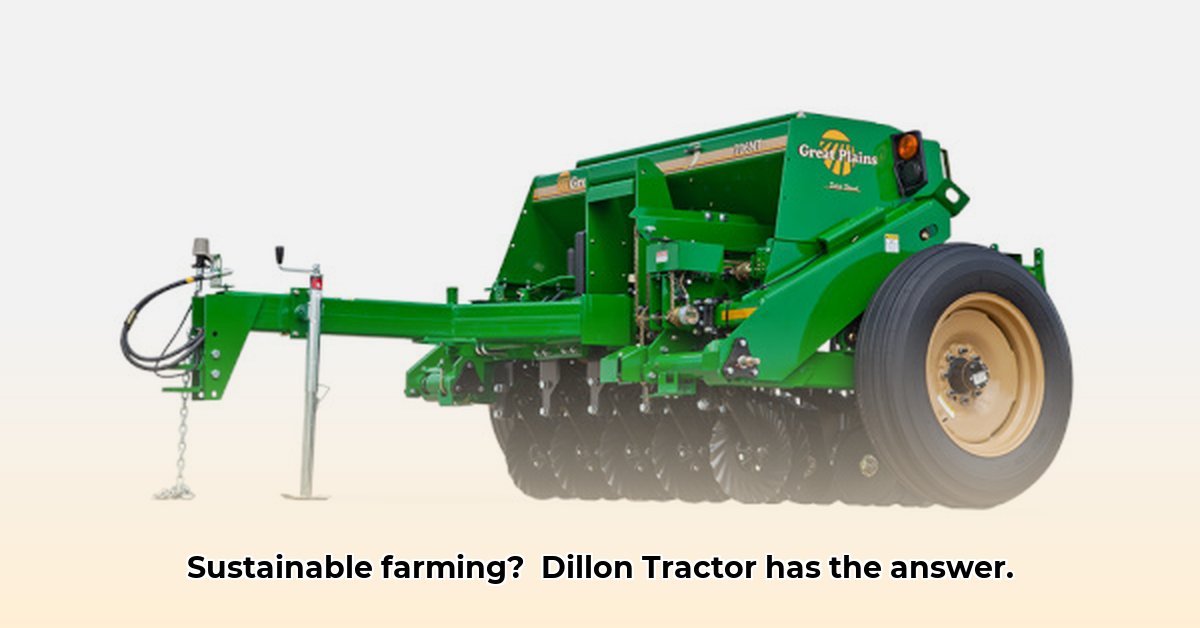
Dillon Tractor and Implement: Embracing Sustainable Agriculture in South Carolina
Dillon Tractor & Implement Co. (DTIC), a cornerstone of South Carolina's agricultural landscape, stands at a pivotal juncture. The increasing demand for sustainable farming practices presents both challenges and immense opportunities. Can DTIC, with its rich history and strong customer relationships, successfully navigate this transition and not only survive but thrive in a rapidly changing marketplace? The answer lies in strategically embracing sustainable agriculture. For more information on Kubota tractors, check out Kubota Tractors.
More Than Just Tractors: DTIC's Current Standing and Market Landscape
For decades, DTIC has served South Carolina farmers, providing a diverse range of equipment from trusted brands like Case IH and Kubota. Their extensive inventory—from tractors and planters to harvesters—offers farmers a convenient one-stop shop. However, a critical analysis reveals a missed opportunity: a lack of prominent emphasis on sustainable and environmentally friendly equipment and practices on their current platform. This oversight could be hindering their ability to attract the growing number of environmentally conscious farmers and consumers.
The market for sustainable agricultural practices is experiencing significant growth. Precision agriculture, employing technology to optimize resource use, is particularly promising. DTIC's existing partnership with Case IH, a provider of numerous precision agriculture solutions, positions them favorably. Furthermore, the market for used, well-maintained equipment presents a unique opportunity to cater to smaller, often sustainability-focused, farms seeking cost-effective solutions.
Building a Sustainable Future: Actionable Strategies for DTIC
To effectively integrate sustainability into its business model, DTIC requires a multi-phased approach:
Phase 1: Immediate Actions (Year 1)
- Website Revitalization: A comprehensive website redesign is crucial. The new site must prominently showcase DTIC's commitment to sustainability by clearly highlighting fuel-efficient tractors and precision farming tools, complemented by impactful visuals and intuitive navigation.
- Competitive Benchmarking: A thorough analysis of competitors' sustainability initiatives is vital to identify opportunities for differentiation and strategic advantage. What are the best practices? Where are the gaps in the market that DTIC can fill?
- Targeted Marketing Campaign: A focused campaign targeting environmentally conscious farmers is essential. This might involve targeted online advertising, strategic partnerships with local agricultural organizations, and active participation in relevant trade shows.
Phase 2: Long-Term Sustainability (Years 2-5)
- Comprehensive Sustainability Program: DTIC should develop a holistic sustainability program extending beyond equipment sales. This could include partnerships with local environmental groups, initiatives to reduce the company's carbon footprint, and educational workshops promoting sustainable agricultural practices.
- Employee Training and Development: Investing in employee training is vital for equipping staff to effectively communicate the benefits of sustainable agriculture and answer customer inquiries accurately.
- Customer Loyalty Programs: Incentives for adopting eco-conscious methods, such as loyalty points, discounts, and educational resources, will reward customers and foster long-term relationships.
Navigating Challenges: Proactive Risk Mitigation
DTIC faces potential challenges, requiring proactive mitigation strategies:
| Risk Factor | Likelihood | Impact | Mitigation Strategy |
|---|---|---|---|
| Increased Competition | Medium | High | Proactive market research, niche marketing targeting sustainable solutions, strong customer relationships |
| Failure to Adapt | High | Very High | Comprehensive sustainability plan, ongoing employee training, diverse equipment offerings, transparent communication of sustainability initiatives. |
| Economic Downturn in Agriculture | Medium | Medium | Diversified service offerings, flexible financing options, maintaining strong customer relationships. |
| Supply Chain Disruptions | Medium | Medium | Secure multiple suppliers, strategic inventory management, diversifying sourcing locations. |
The Future of Farming is Sustainable: DTIC's Pathway to Growth
DTIC possesses a strong foundation: a respected name, loyal customer base, and a wide range of equipment. However, embracing sustainability is not merely an option but a necessity for long-term success. By implementing the strategies outlined above, DTIC can secure its position as a leader in South Carolina's sustainable agriculture sector. This transition requires dedication, but the rewards—a thriving business and a more environmentally sound future—are substantial.